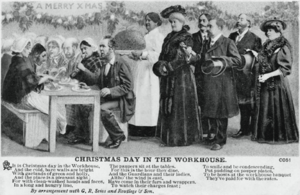Christmas Day in the Workhouse facts for kids

In the Workhouse : Christmas Day, often called Christmas Day in the Workhouse, is a powerful story poem. It was written by George Robert Sims, a journalist who worked to expose social problems. The poem first appeared in a newspaper called The Referee for Christmas in 1877. It was part of Sims' regular column, where he used the pen name Dagonet. Later, it was put into a book called The Dagonet Ballads in 1881. This book was very popular, selling over 100,000 copies in just one year.
This poem criticizes the very tough conditions in English and Welsh workhouses. These were places where poor people had to live and work under strict rules, set by the 1834 Poor Law. Because the poem was so popular and emotional, it has been made fun of or copied in many ways over the years.
Contents
Understanding the Poem: "Christmas Day in the Workhouse"
This section helps you understand the famous poem.
How the Poem Begins
The poem starts by setting a scene on Christmas Day inside a workhouse.
It is Christmas Day in the Workhouse,
And the cold bare walls are bright
With garlands of green and holly,
And the place is a pleasant sight;
For with clean-washed hands and faces,
In a long and hungry line
The paupers sit at the tables,
For this is the hour they dine.
And the guardians and their ladies,
Although the wind is east,
Have come in their furs and wrappers,
To watch their charges feast;
To smile and be condescending,
Put pudding on pauper plates,
To be hosts at the workhouse banquet
They've paid for—with the rates.
What Happens in the Story
The poem tells the story of an old trader from Devon named John. He has become very poor and must eat at the workhouse on Christmas Day. Everyone is shocked when he speaks out against the workhouse leaders. He blames them for what happened last Christmas.
His wife, Nance, was starving. They had no money for food. So, for the first time, John went to the workhouse for help. But he was told that food would not be given out. Instead, he and his wife would have to move into the workhouse to eat.
At that time, families were often separated inside these workhouses. But John's wife refused to be apart from her husband of fifty years on Christmas Day. John went out again to find food scraps. Sadly, his wife died before he returned. Now, John is filled with sadness and anger because of that memory.
About the Author: George Robert Sims
George Robert Sims was a campaigning journalist. This means he wrote articles to bring attention to social problems and push for change. When he was young, he looked into the lives of poor people in London's East End.
The details in his poem might not have been perfectly accurate. For example, the Poor Law rules sometimes allowed old couples to live together. They also allowed for short-term help to be given out. However, the poem's emotional and dramatic style made it very popular. This success helped Sims become famous. He continued to write detailed reports about the lives of the poor. His work appeared in newspapers like the Weekly Dispatch, The Pictorial World, and The Daily News. The last one was started by the famous writer Charles Dickens.
Funny Versions: Parodies of the Poem
Because Sims' poem was so well-known, many people created funny versions of it. These are called parodies.
Examples of Parodies
One famous parody is "Christmas Day in the Cookhouse" from 1930. It was written by British comedian Billy Bennett. A soldier recites it in the 1969 film Oh! What a Lovely War.
Other parodies include "'Twas Christmas Day in the Poorhouse" (2000) by Garrison Keillor. Also, a listener sent in "Christmas Day in Grey Gables" to the BBC Radio 4 show The Archers.
It was Christmas Day in the cookhouse, the happiest day of the year
Mens hearts were full of gladness, and their bellies full of beer
When up popped Private Shorty, his face as bold as brass
He said "you can take your Christmas pudding
And stick it up your....."
Tidings of comfort and joy, comfort and joy
O, tidings of comfort and joy

